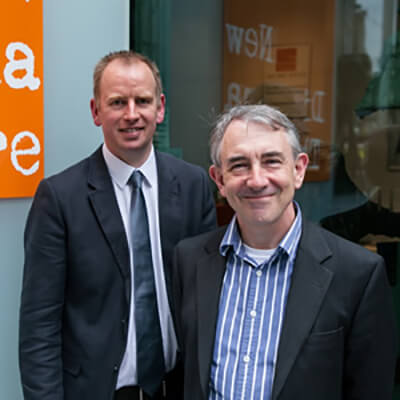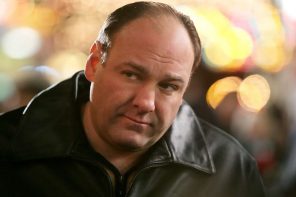Introducing our Sitcom Writing teachers Declan Hill and Simon Wright. Declan and Simon talk to us about what makes for a great sitcom, their very own international sitcom writing competition, and what to expect on their course. Find out why Julie Bower, who wrote CBBC’s So Awkward, said that Declan and Simon are “genuinely passionate about what they do...they encourage new talent and I love them”.
You’ve been working together for a long time. What do you like about working together, and how do feel your different styles complement each other?
We come as a package and the classes wouldn’t be the same if it were just one of us teaching. It doesn’t feel like work for either of us because we have enormous fun doing what we do and it’s great to have someone to share it with. When it comes to script reading, one of us will immediately see what’s right with a script and the other will see what’s wrong with it.
You both have varied performance backgrounds. How has this helped shape your teaching and other work?
We met as writer/performers – Simon is a working actor and Declan did stand-up and improv – so we have an ear for dialogue, jokes and bringing the work off the page. We like to think that it helps in class as well because performance is 90% confidence and we really encourage our writers to be confident and present their work with pride. We’ve had lots of students who’ve come to our courses with writers block and they’ve broken through using our methods. One guy had done an eight-week course elsewhere and literally hadn’t written anything. He came to us with the same problem and was cured by week three.
You have been running the Sitcom Mission for eight years now. Could you tell us a little bit about it?
It’s an international sitcom-writing competition with an emphasis on script development and a fantastic prize of an industry showcase in front of TV and radio comedy commissioners, production companies and literary agents. Last year, three of the four finalists – including the joint winners – had done our Sitcom Writing courses and this year we had one writer in the final. We had an excellent showcase this year and three of the finalists have been approached by production companies, and the other has secured meetings with literary agents. Next year we’ll be filming the winning entry, giving the winning writer has a fantastic industry calling card.
What do you think are the key ingredients for the perfect sitcom?
Difficult to say because it hasn’t been written yet. James Cary, who does the Sitcom Geek blog, talks about the five Cs – characters, conflict, confinement, catastrophe and catchphrase. It’s a good start.
What’s your favourite sitcom at the moment and why?
We both love You, Me and the Apocalypse on Sky 1. It’s a classic example of ordinary people battling against extraordinary circumstances – political and religious conspiracy, evil people that we’re forced to be friends with, a quest to find out who we really are – and if the stakes are big we care more. It’s also intelligent, funny and if we needed any more reason to love Megan Mullally, we have it.
What is the biggest misconception about sitcom writing you encounter?
A major misconception is that sitcoms are about jokes. They’re really not. Try to recall 10 jokes from all the thousands of hours of sitcom that you’ve seen. Actual jokes that would be funny regardless of who said them, that is. Bet you can’t.
What would you say to someone who is nervous about taking the Sitcom Beginners course?
It’s natural to be nervous whether you’ve already written something, or you’ve never written anything before, but we pride ourselves on creating an atmosphere in which everybody is too busy to be nervous for long. We’ve had couples do a Taster as a date night which was fun. Having worked in live sitcom and within the industry for some time, we know we can’t guarantee fame, fortune and riches, but we promise you’ll have the most fun you’ll have on an eight-week course, your writing will improve and your confidence in your writing will grow. Lots of writing groups have been started too and people have met great friends and writing partners on our course. We’re waiting for our first wedding invitation…
What’s your favourite exercise to do in class to spark students’ creativity?
We’ve got a great joke-writing exercise that we do in week one which we do in order to get their pens moving and to show students that they shouldn’t judge their work or edit it before they’ve written it. It’s a great way of showing the students that other people might like what they’ve written, so they should be proud of it.
What are your three top tips for anyone trying to crack their first sitcom script?
First off, do our course. Secondly, buy our book. Seriously? Ok, we had a great piece of advice from script reader Ray Grewal, who said that many people sit down to write a sitcom or a film but few sit down to write a story. So find out what story you want to tell. Secondly, let us hear the characters speak in their own voices – it sounds counter-intuitive but your voice will really come through when your characters have theirs. And third, enjoy rewriting.
Could you tell us about one of your students who has continued comedy writing after taking your course(s)?
We had one student that struggled to find her voice throughout the course but she really broke through in the last week. There was a professional stand-up comedian on the course as well and she offered to work with her on the script. The last we heard she was applying for the full-time NFTS/Channel 4 Comedy Writing course.







